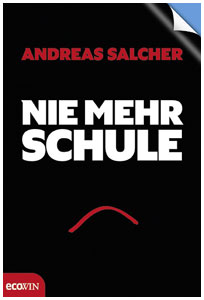
No More School
Our educational system continues to get more and more expensive even as it deteriorates. Such a morbid educational system leads to the impediment of pupils’ talents thus leaving teachers dispirited. After school parents are forced to serve as private tutors because power clinging teachers’ union members and timid politicians have been blocking most attempts at reform over the past 30 years. However, they should know very well how good schools function. Children are being deprived of their opportunities in life right in front of our very eyes. We cannot possibly continue to remain aloof of this situation.
End child humiliation. End harassment of zealous teachers. Put an end to hours of teaching in frontal mode. Ban days without exercise. Never again dread the next day of school.
Andreas Salcher, Austria’s most relentless critic of the educational system, fears no taboo: He unmasks the doers and culprits who are determined to keep our school system locked in the pedagogic Middle Ages.
Table of Contents
The deadly school – Why it still exists and who defends it
- The lies of politicians
- Our school system is only being badmouthed
- We need more teachers and more funds
- From now on everything will get better
- The errors of the teachers’ union
- Teachers are stressed out and not able to stay on after class
- Teachers must be experts in their subjects and meet their curriculum’s requirements
- How we all are deceiving ourselves
- We consider education essential
- Blame the teachers
- There is nothing we can do
More and More Joy
A school can very well be a place where children feel comfortable and study with joy and enthusiasm. There, the teachers do not expect anything from their pupils but simply trust in their potential. In the Inspiring School, pupils are being touched rather than brought to perfection – so they continue to understand their world a little better every day. The essential element here is the relationship between teachers and pupils and their appreciation for one another.
Andreas Salcher knows the world’s best schools. Instead of making statements he reveals truths – such as: Pupils do not only have brains, they have bodies, too. They are more interested in people than subjects.
MORE AND MORE JOY points out where to find the Inspiring Schools. Every child has the right to attend one. Now – and not in ten or twenty years time.
Table of Contents
The Inspiring School – where you can find it and how it works
- The seven truths of Inspiring Schools
- Everything has to abide by the law of appreciation
- Children have bodies
- Pupils are more interested in people than subjects
- Pupils who are involved in theater do better in math
- Children love to make an effort
- Children want to be evaluated in a fair way
- Any change triggers resistance at the very outset
- There is a conspiracy to the good
- The unstoppable revolution – why learning will turn into something enjoyable
Leseproben
You can buy "No More School" at your local bookseller or you can order it at Amazon.
press commentaries
Tell Andreas Salcher what you think
The author values your opinion about the book. Send an email to andreas@salcher.co.at or visit Andreas Salcher’s blog.
